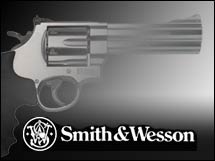|
A stock with firepower: Smith & Wesson The maker of Dirty Harry's gun is hitting tougher targets lately, and its share price has been shooting up.
Looking for a small-cap stock that could "make your day"? Smith & Wesson, the 154-year-old gun maker, could add firepower to your portfolio. The company has been hitting its targets lately thanks to new product lines, new management, and a return to profitable market segments. Over the past three quarters alone, revenues have grown 20%. Analysts estimate that earnings will rise 60% next year.
Already, Smith & Wesson's stock has shot up from under $2 at the beginning of 2005 to more than $7 recently. (Yet its valuation, 24 times next year's earnings, seems reasonable given that the S&P specialty retail index currently averages 22.) Legislative changes have helped - specifically, the lapse of the 1994 assault rifle ban and the passage of the Protection of Lawful Commerce in Arms Act. While the assault rifle ban didn't affect Smith & Wesson's product line directly, it signals a more gun-friendly environment. The Commerce in Arms Act, approved by Congress in 2005, prohibits civil lawsuits against gun makers, distributors and dealers when its guns are misused. Smith & Wesson has been relieved of several legal proceedings as a result. The military market is also more friendly these days. Merriman Curhan Ford analyst Eric Wold sees potential for growth in this segment. "There is a big push [in the military] towards buying American guns," says Wold. "They don't want our troops carrying foreign weapons when they can buy something from a domestic manufacturer." Smith & Wesson will be vying for a military handgun contract currently held by Beretta that expires in 2007. Wold thinks Smith & Wesson has a very good chance of winning the deal, estimated to be worth $300 million to $500 million. Given that sales were just under $126 million in fiscal 2005, such a contract could have a huge impact on the bottom line. Things haven't always been so rosy. Founded in 1852, Smith & Wesson dominated the handgun business in the consumer, military and law-enforcement markets for almost a century. But in the early 1980s, it lost market share, partly because Austrian gun maker Glock introduced a polymer pistol to U.S. police and military. Lighter and easy firing, the new pistol took off. After that, Smith & Wesson went from supplying the majority of guns to law enforcement agencies to close to zero. Similar declines hit the company in the military market and over the following decades Smith & Wesson, while still one of the biggest brands in consumer handguns, suffered. By the end of fiscal 2002, Smith & Wesson had a net loss of over $5 million. Michael Golden, one of the executives responsible for the huge success of the DeWalt line at Black & Decker, became CEO in November of 2004 and began developing a turnaround plan. Golden, who had never shot a firearm prior to taking the job, said the strength of the brand was very appealing. "I realized that this was a company that had been under-managed and under-marketed for at least 15 years, with a terrific legacy brand that I thought had a lot of power," he says. A study commissioned by Smith & Wesson confirmed Golden's feelings. The inquiry found brand awareness so strong that consumers said they would consider Smith & Wesson not only for handguns, but for products it didn't produce - like shotguns, hunting rifles, and even security systems. "This told us that the brand can be much, much more than just handguns," says Golden. "We've changed our focus from being a handgun company in the sporting-goods channel in the U.S., to a company in the global business of safety, security, protection and sport." Golden made some key hires to implement his plan - salespeople with expertise in the military and law-enforcement markets, a licensing executive who spent much of her career at Harley-Davidson, and a marketing VP from Coke. The people and the plan have paid off. After introducing a new polymer pistol designed specifically for the police and military market, Smith & Wesson has regained share. Just in the past month, Smith & Wesson received orders from the California highway patrol and North Carolina's department of correction, an estimated $9 million in sales. In 2005, it received its first military contracts in 15 years and in 2006 has secured a $15 million contract to supply the Afghanistan national army with 9mm pistols. After 154 years, it feels like Smith & Wesson is just getting started. The company has made inroads in law enforcement and military markets, is introducing new product lines, has a powerful brand, a strong management team, and growing sales and income. Smith & Wesson looks like a good shot. 50 small-cap stocks that rock. See the list. |
Sponsors
|

